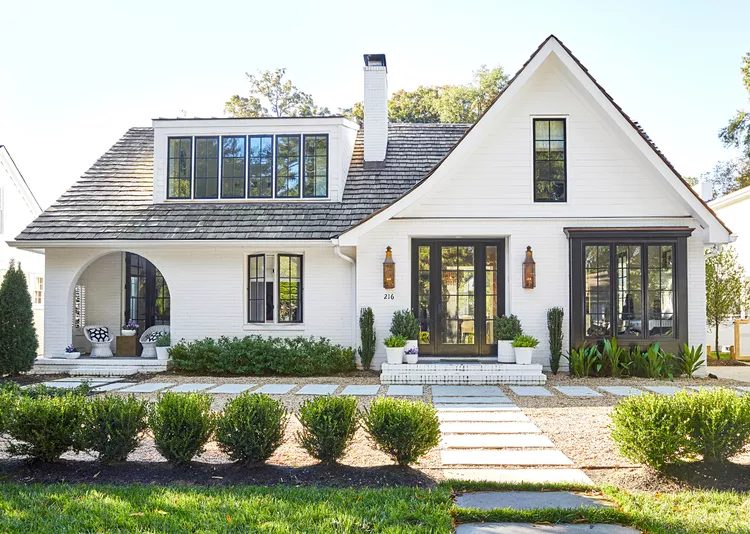Deciding between old and new? There are pros and cons to buying a new construction home that you’ll want to consider as you shop
As you search for a new home, you might find yourself categorizing your options into new and old builds. While older homes might offer the kind of layout, price point, and durability you’re looking for, they also come with their own problems. A new build, on the other hand, offers a buyer a clean slate.

“Buying a new construction home has many perks, but there are a few potential drawbacks to keep in mind,” says Scott Bergmann, a Realtor with Realty ONE Group in Omaha, Nebraska.
As you sort through various available homes, these experts have some pointers on what new construction homes have to offer—and what they leave to be desired.
Pros of Buying a Newly Built Home
New homes have tons of pros, including the sense of peace knowing you’re the first homeowner to live at the property. There’s more to it than just that feeling, though.
“Home repairs can be expensive—on average, homeowners spent nearly $6,000 on home repairs and maintenance in 2022, according to Hippo’s report,” says Courtney Klosterman, home insights expert at home insurance provider Hippo. “When you purchase a new construction home, you have a clearer idea of the critical systems that make up your home and the warranty information that helps keep your appliances maintained over time.”
In a recent study by Hippo, 78% of U.S. homeowners surveyed have had regrets about purchasing their homes. According to Hippo’s Housepower Report, those regrets could be broken down this way:
- 47% say that they have had too many unexpected issues with their home
- 47% say there is too much maintenance and upkeep involved
- 46% say that they compromised on things they really wanted for their home
It’s a pretty strong case for buying new, Klosterman says.
Customization
When you buy an existing home, the floorplan you see is the floorplan you get. New construction homes offer much more flexibility and opportunity for you to make the decisions, making it more likely that you can get exactly the layout you want.
“With a new construction home, you have the ability to customize the layout, design, and features to your liking. You can choose your own finishes, flooring, cabinets, and more,” says Jessica Poulos, co-owner and broker at Better Homes and Gardens Real Estate Northwest Home Team.
Building your own home often means you have more ways to customize the property. If you’re working one-on-one with a builder, you’ll likely have control over every aspect. If you’re working with a builder who is developing an entire community, those choices might be narrowed down to finishes, carpet colors, flooring, and the like.
Buying a new construction home will also offer some opportunities for customization. Oftentimes, these new builds are part of a larger community where builders used a handful of plans to construct all of the homes on the property. So you might get to choose from one of those floorplans, offering a different number of bedrooms, layouts, and features.

New Systems and Warranties
A new home doesn’t just mean new paint and flooring: It also means all new heating and cooling systems and appliances. That means fewer hiccups with your home’s plumbing, roof, and other key infrastructure.
“New construction homes are built with the latest energy-efficient materials and appliances, which can save you money on energy bills in the long run,” says Steve Poulos, co-owner and broker at Better Homes and Gardens Real Estate Northwest Home Team.
Even with all new features, you’ll still want your home to be under warranty—and many newly built homes are.
“Most new construction homes come with a builder’s warranty, which means any issues or defects that arise within the first few years are covered by the builder,” Jessica Poulos says. “Usually this is a two-year warranty. We recommend that the homeowner conduct a home inspection right before this timeframe is up and send any necessary repairs to the builder.”
It’s worth noting that you can purchase warranties for older homes, as well.
“Home warranties are meant to supplement home insurance policies by covering your home’s internal systems and major appliances, giving your home an extra layer of protection,” Klosterman says.
No Repairs Needed
Because your home is newly built, you shouldn’t have to worry about making major repairs immediately.
“A new construction home requires less maintenance compared to a used home, which may have outdated systems and appliances that need to be replaced,” Steve Poulos says.
Similarly, you likely won’t want to plan major renovations to drastically change the home’s layout and features for many years—hopefully your new-construction home is already complete with the modern finishes you’d renovate an older home to have.
“When you buy a used home, you may need to renovate or update certain areas to fit your needs and preferences,” Steve Poulos says. “With a new construction home, everything is brand new and ready for you to move in.”
Not only is the home in peak condition, but you’ll also likely save money on utilities and insurance.
“A new construction home also has the latest safety and building codes, meaning that it is likely to be up-to-date and safe for occupants,” Bergmann says, meaning those new features will cost less for you to insure.

Modern Finishes
Gone are the days of split-levels and cramped second floors common in bungalows. These days, buyers are looking for more modern layouts in their homes, and when you buy new, those features are built-in.
“New construction homes often come with modern features such as smart home technology, energy-efficient windows, and open floor plans,” Jessica Poulos says.
If you can remember the types of projects you planned for your previous home, imagine having a new home with those design tastes already taken into account. Many home buyers are looking for features such as dedicated office spaces, functional yards, and upgraded kitchens and bathrooms. New homes are more likely to have those things.
Cons of Buying a New Construction Home
Of course, newly built homes aren’t perfect. There are some compromises you’ll have to make if you choose to go this route.
A New Neighborhood
Many new developments are built in previously undeveloped areas of a city or county, meaning there is likely less infrastructure nearby—think restaurants, shops, and schools.
If you’re game to wait for amenities such as grocery stores, gas stations, and parks to be built and opened around you, it could be great to get in on the ground level of a new neighborhood. If you’re reluctant to travel to these necessities in the meantime, you might want to shop for a home in a more established area, possibly an older home.
On the flip side, Jessica Poulos says a new community could be a good indicator of the area’s health and potential for growth.
“We also like the idea that new construction is a ‘safe’ bet. Because multiple homes are being built in the neighborhood, it holds its value,” she says.
Varied Levels of Workmanship
A new home is only as good as its builder, which is why you’ll want to do your homework before blindly buying new.
Bergmann points out that construction quality can vary significantly depending on the builder, so buyers should research their builder’s reputation and track record.
“When considering a new construction home, it’s crucial to evaluate the quality of the builder and their work. One way to do this is to read online reviews and ask for personal references from current homeowners,” he says. “You can also take it a step further and directly reach out to subdivisions that the builder has previously built in to ask for references. This will give you a better sense of the builder’s reputation and the quality of their work. Don’t skimp on research when it comes to such a big investment.”
A real estate agent can help you here, as well, but keep in mind that you will still get an opportunity to have an inspection of the property done before the deal goes through—any major building defects should come out then.
Moving Delays
Buying a home is a lengthy process, and timing your move out and move in dates can be complicated. It’s no easier with new builds.
“New construction homes may have unforeseen issues, such as incomplete work or design flaws, that can result in additional expenses and delays,” Bergmann says.
Delays are common in new build schedules. So much can change as a company sources materials and labor to finish your home. Work with a real estate agent to get a good handle on those schedules and to stay updated. You might need to secure temporary housing or have an option on standby should the project fall behind.
Bergmann also points out that many new builds are part of larger, planned communities, which can be costly.
“Unexpected expenses such as landscaping or HOA fees can add up quickly, so make sure you’re aware of these costs before you commit,” he says.

How to Decide Between a New Construction Home and an Older House
New homes offer customization options and ways to save money on future repairs and maintenance, while older homes have proven durability and exist in well-established neighborhoods. As you decide between purchasing a new build and an older home, consider your current financial situation and the other personal factors at play.
“When deciding between a new construction and an older home, buyers should consider several factors. These include budget, financing options, and the level of involvement they want in the construction process,” Bergmann says.
An older home might fit the bill if you can’t afford a new build. If you want to be hands-on in the process, a new build could be the answer. Consider too whether you want a move-in ready home, Bergmann says.
“Finally, don’t forget to consider factors such as location, community amenities, and resale value when making your decision,” he says. “Weighing all these factors will help you make the best decision for your lifestyle and budget.”

